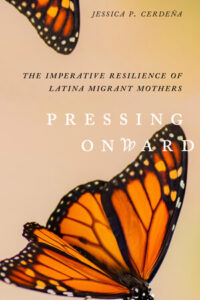
Pressing Onward: The Imperative Resilience of Latina Migrant Mothers centers the stories of mothers who migrated from Latin America, settled in New Haven, Connecticut, and overcame trauma and ongoing adversity to build futures for their children. These migrant mothers enact imperative resilience, engaging cognitive and social strategies to resist racial, economic, and gender-based oppression to seguir adelante, or press onward. Both a contemporary view of the impacts of the COVID-19 pandemic on racially minoritized populations and a timeless account of the ways immigration enforcement and healthcare inequality affect migrant mothers, Pressing Onward uses ethnography to tell a greater story of persistence amid long-standing structural violence.
Jessica P. Cerdeña is an anthropologist, family physician-in-training, and mother of two who lives in New Haven, Connecticut, where she advocates for racial justice and health equity (Twitter: @jes_cerdena).
What motivated you to write Pressing Onward?
Pressing Onward grew out of my longstanding work with migrant communities here in New Haven, first as a clinical student working at a local free clinic and then as an anthropologist. These women disclosed their challenges migrating and living here—including during the start of the COVID-19 pandemic—and the powerful strategies they used to get by in the day-to-day. Many women repeated that their stories needed to be told, and that really pushed me to get this book out. It will be published less than two years after I finished my last interview.
What new insight does your book provide in understanding the impacts of immigration enforcement and healthcare inequality on migrant mothers in the U.S.?
First, state failure and inequalities of opportunity in Latin America—largely influenced by U.S. interventionism—make it difficult for women to realize their full potential back home, and prompt them to migrate. Second, undocumented migration and fear of immigration enforcement makes women servile and exploitable. Finally, persistent stereotypes about ‘hyperfertile’ Latinas coming to the United States to have ‘anchor babies’ make giving birth as a Latina migrant mother a process of racialization.
What are some examples of how these mothers resisted structural oppression and showed imperative resilience?
This came up so often that I knew the title of the book would be “siguiendo/saliendo adelante” (pressing onward) before I even finished my interviews. In general, “imperative resilience” looks like women stringing together jobs or cutting back on household expenses to make ends meet, swallowing down painful emotions to be ‘strong’ for their children, and turning to prayer or the wisdom of their grandmothers to cope with unexpected stressors. One woman put it as “you have to cover as much of your legs as you can with as far as the blanket reaches.” Women told me they did all this to help their children get ahead.
What was something unexpected or surprising that you learned while working on the book?
Given the violence some of these women endured, I expected many of them to tell me they worried about how those traumas might affect their unborn children. To my surprise, hardly any did. Instead, they described how they believed their strengths—and the strengths of their mothers—carried through their wombs to shape their babies. They narrated beautiful visions for their children’s lives. One woman named Juana told me, “I believe everything is transmitted. I must be strong for her to give her [my daughter] strength. And she will be strong. Why? Because her mother is.” I name these women’s belief in the matrilineal passage of positive traits “intergenerational fortitude.”
What’s the main thing you hope readers will take away from the book?
We, as a country, need to stop demanding that migrants be ‘resilient’ to survive here. We can establish more equitable and supportive policies that afford basic standards of living, healthcare, and a pathway to citizenship for longstanding residents.
